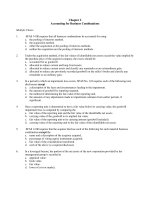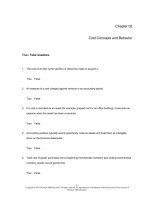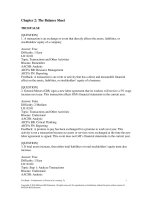Advanced accounting 5th edition
Bạn đang xem bản rút gọn của tài liệu. Xem và tải ngay bản đầy đủ của tài liệu tại đây (118.5 KB, 10 trang )
Advanced Accounting 5th Edition Description
Stock given as consideration for a business combination is valued at
1. a. fair market value
2. b. par value
3. c. historical cost
4. d. None of the above
Which of the following situations best describes a business combination to be
accounted for as a statutory merger?
1. a. Both companies in a combination continue to operate as separate, but
related, legal entities.
2. b. Only one of the combining companies survives and the other loses its
separate identity.
3. c. Two companies combine to form a new third company, and the original two
companies are dissolved.
4. d. One company transfers assets to another company it has created.
A firm can use which method of financing for an acquisition structured as
either an asset or stock acquisition?
1. a. Cash
2. b. Issuing Debt
3. c. Issuing Stock
4. d. All of the above
The objectives of FASB 141R (Business Combinations) and FASB 160
(Noncontrolling Interests in Consolidated Financial Statements) are as
follows:
1. a. to improve the relevance, comparability, and transparency of financial
information related to business combinations.
2. b. to eliminate the amortization of Goodwill.
3. c. to facilitate the convergence project of the FASB and the International
Accounting Standards Board.
4. d. a and b only
A business combination in which the boards of directors of the potential
combining companies negotiate mutually agreeable terms is a(n)
1. a. agreeable combination.
2. b. friendly combination.
3. c. hostile combination.
4. d. unfriendly combination.
A merger between a supplier and a customer is a(n)
1. a. friendly combination.
2. b. horizontal combination.
3. c. unfriendly combination.
4. d. vertical combination.
The impairment standard as it relates to goodwill is an example of a
1. a. consumption of benefit approach.
2. b. loss or lack of benefit approach.
3. c. component of other comprehensive income.
4. d. direct matching of expenses to revenues.
The defense tactic that involves purchasing shares held by the would-be
acquiring company at a price substantially in excess of their fair value is
called
1. a. poison pill.
2. b. pac-man defense.
3. c. greenmail.
4. d. white knight.
The third period of business combinations started after World War II and is
called
1. a. horizontal integration.
2. b. merger mania.
3. c. operating integration.
4. d. vertical integration.
Which of the following is not a component of other comprehensive income
under GAAP?
1. a. earnings.
2. b. gains and losses that bypass earnings.
3. c. impairment losses.
4. d. accumulated other comprehensive income.
When a new corporation is formed to acquire two or more other corporations
and the acquired corporations cease to exist as separate legal entities, the
result is a statutory
1. a. acquisition.
2. b. combination.
3. c. consolidation.
4. d. merger.
The excess of the amount offered in an acquisition over the prior stock price
of the acquired firm is the
1. a. bonus.
2. b. goodwill.
3. c. implied offering price.
4. d. takeover premium.
The difference between normal earnings and expected future earnings is
1. a. average earnings.
2. b. excess earnings.
3. c. ordinary earnings.
4. d. target earnings.
The first step in estimating goodwill in the excess earnings approach is
to
1. a. determine normal earnings.
2. b. identify a normal rate of return for similar firms.
3. c. compute excess earnings.
4. d. estimate expected future earnings.
Many of FASB’s recent pronouncements indicate a shift away from historical
cost accounting toward
1. a. an elevated status for the Statements of Financial Accounting Concepts.
2. b. convergence of standards.
3. c. fair value accounting.
4. d. representationally faithful reporting.
Estimated goodwill is determined by computing the present value of the
1. a. average earnings.
2. b. excess earnings.
3. c. expected future earnings.
4. d. normal earnings.
Which of the following statements would not be a valid or logical reason for
entering into a business combination?
1. a. to increase market share.
2. b. to avoid becoming a takeover target.
3. c. to reduce risk by acquiring established product lines.
4. d. the operating costs of the combined entity would be more than the sum of
the separate entities.
The parent company concept of consolidation represents the view that the
primary purpose of consolidated financial statements is:
1. a. to provide information relevant to the controlling stockholders.
2. b. to represent the view that the affiliated companies are a separate,
identifiable economic entity.
3. c. to emphasis control of the whole by a single management.
4. d. to include only a portion of the subsidiary’s assets, liabilities, revenues,
expenses, gains, and losses.
Which of the following statements is correct?
1. a. Total elimination is consistent with the parent company concept.
2. b. Partial elimination is consistent with the economic unit concept.
3. c. Past accounting standards required the total elimination of unrealized
intercompany profit in assets acquired from affiliated companies.
4. d. none of these.
Under the parent company concept, consolidated net income __________ the
consolidated net income under the economic unit concept.
1. a. is the same as
2. b. is higher than
3. c. is lower than
4. d. can be higher or lower than
Under the economic unit concept, noncontrolling interest in net assets is
treated as
1. a. a liability.
2. b. an asset.
3. c. stockholders' equity.
4. d. an expense.
The parent company concept adjusts subsidiary net asset values for the
1. a. differences between cost and fair value.
2. b. differences between cost and book value.
3. c. total fair value implied by the price paid by the parent.
4. d. total cost implied by the price paid by the parent.
According to the economic unit concept, the primary purpose of consolidated
financial statements is to provide information that is relevant to
1. a. majority stockholders.
2. b. minority stockholders.
3. c. creditors.
4. d. both majority and minority stockholders.
Which of the following statements is correct?
1. a. The economic unit concept suggests partial elimination of unrealized
intercompany profits.
2. b. The parent company concept suggests partial elimination of unrealized
intercompany profits.
3. c. The economic unit concept suggests no elimination of unrealized
intercompany profits.
4. d. The parent company concept suggests total elimination of unrealized
intercompany profits.
When following the parent company concept in the preparation of
consolidated financial statements, noncontrolling interest in combined
income is considered a(n)
1. a. prorated share of the combined income.
2. b. addition to combined income to arrive at consolidated net income.
3. c. expense deducted from combined income to arrive at consolidated net
income.
4. d. deduction from current assets in the balance sheet.
When following the economic unit concept in the preparation of consolidated
financial statements, the basis for valuing the noncontrolling interest in net
assets is the
1. a. book values of subsidiary assets and liabilities.
2. b. fair values of subsidiary assets and liabilities.
3. c. general price level adjusted values of subsidiary assets and liabilities.
4. d. fair values of parent company assets and liabilities.
The view that consolidated financial statements represent those of a single
economic entity with several classes of stockholder interest is consistent with
the
1. a. parent company concept.
2. b. current practice concept.
3. c. historical cost company concept.
4. d. economic unit concept.
The view that the noncontrolling interest in income reflects the
noncontrolling stockholders' allocated share of consolidated income is
consistent with the
1. a. economic unit concept.
2. b. parent company concept.
3. c. current practice concept.
4. d. historical cost company concept.
The view that only the parent company's share of the unrealized
intercompany profit recognized by the selling affiliate that remains in assets
should be eliminated in the preparation of consolidated financial statements
is consistent with the
1. a. economic unit concept.
2. b. current practice concept.
3. c. parent company concept.
4. d. historical cost company concept.









